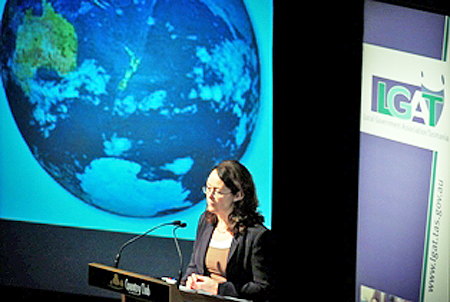Departing thoughts from the inaugural chair of Tasmania’s Climate Action Council [21 February 2012 | Peter Boyer]

Kate Crowley addresses a conference of the Local Government Association of Tasmania, 19 June 2008 (PHOTO PHILLIP BIGGS)
Time is speeding up — have you noticed? As a child, a couple of hours in a classroom was an eternity, but now I’m still getting used to a year (or a decade) when we arrive at the next one.
Associate Professor Kate Crowley’s departure as inaugural chair of the Tasmanian Climate Action Council, effective at the start of this year, is a sharp reminder of the passage of time. Is it really four years since she took up Premier Paul Lennon’s challenge to audit government energy use?
Our effort to reduce human impact on climate is a long haul. Getting a stable majority to support decisive action will take at least five years, perhaps longer. Significant shifts may take another decade after that. Science says all this has to happen quickly, but politics says otherwise.
From my perspective we’re still starting out, which puts the focus on years to come. So in sitting down with Crowley last week it was a bit disconcerting to realise that a stage of this journey has already ended.
Crowley’s departure is her own decision, made without rancour. She always saw her work as fixed-term: “I don’t believe that anyone is indispensable and I like to see positions of power rotated.”
Whatever the future role of the TCAC, says Crowley, it will be different from its first three years. The “broad-brush” work has been done — “how to reach our long-term target, why we need an interim target, and all the ways of getting there”. Now the TCAC needs to focus on the “how”.
The first three years of the TCAC — note the “A” for Action — has had mixed reviews, but in fairness to Crowley and her eight fellow-members the path over those years has been a rocky one.
Where departments consider themselves unlucky to get a ministerial change every two years, the period since Paul Lennon’s departure in mid-2008 has seen four ministers with direct responsibility for climate change — Premier David Bartlett and his assistant Lisa Singh, Greens leader Nick McKim and, since early last year, Cassy O’Connor.
Crowley’s report card on her political masters is mixed. Her strongest praise is for Lennon: “As a former energy minister he understood sustainability, he was in a powerful position in Cabinet, and he was determined to do something.” His departure, she says, saw the climate agenda falter.
David Bartlett was less focused on climate but gave strong, practical support in her dealings with agency heads. Despite this, many agency heads continued to oppose incorporating climate parameters into their decision-making.
In Lisa Singh, Bartlett’s assistant minister, Crowley found a genuine concern about climate change tempered by too much focus on housing and community issues at the expense of the wider picture. Leading the Greens in the coalition government from March 2010, Nick McKim was committed and knowledgeable, but had too many portfolios to give climate policy the time it deserved.
If Paul Lennon gets Crowley’s gold star, Cassy O’Connor is a close runner-up. “She is a dynamic and accomplished minister, very knowledgeable, very savvy and smart, passionate about taking effective action on climate and energy, with leadership potential.”
But, says Crowley, O’Connor’s party affiliation reduces her effectiveness in an environment-related portfolio. While she has argued strongly for measures proposed by the TCAC — a non-political body — her background has led her Cabinet colleagues to see such proposals as Green issues rather than Tasmanian ones.
Despite caveats, Crowley looks back with pride on TCAC attainments on her watch, including a suite of practical steps to reduce greenhouse gas emissions, a study to determine the value of Tasmania’s forest carbon, advice to establish interim emissions targets and begin an early downward trend, and regular community meetings showcasing solutions.
The TCAC’s immediate future is a matter for the Giddings government, which has yet to name Crowley’s replacement. There’s been no indication of any major shift in the council’s functions or membership.
Now, entering a year in which a national carbon pricing scheme comes into effect, Crowley sees the TCAC as moving into “a more expert phase” requiring specialist knowledge and skills outside her own field of environmental policy.
There have been suggestions that the TCAC should do more in the way of community engagement, including publicly canvassing policy ideas, and be more independent of government. Crowley is firmly against both ideas.
Her favoured model for the council is the “leadership” one, in which the council becomes part of government headed by a senior minister. Queensland’s set-up has most appeal, with the Premier chairing the council “and all the ministers in the room with the experts”.
With time marching on, says Crowley, Tasmania must now find ways to make things happen. Climate action doesn’t have the prominence it enjoyed a few years ago, yet the problem has become more urgent.
Climate and sustainability are still not on ministers’ radar: “All departments, all policies, all administrative decisions, should be tagged with ‘climate-ready’ status.” One way of securing the engagement of heads of agencies could be to make climate change action a mandatory criterion in senior position descriptions.
I doubt we’ve seen the last of Kate Crowley as an advocate for action on climate. Her initial excursion along this road has ended, but her experience will inform us on the longer journey to shape a sustainable Tasmanian community.
